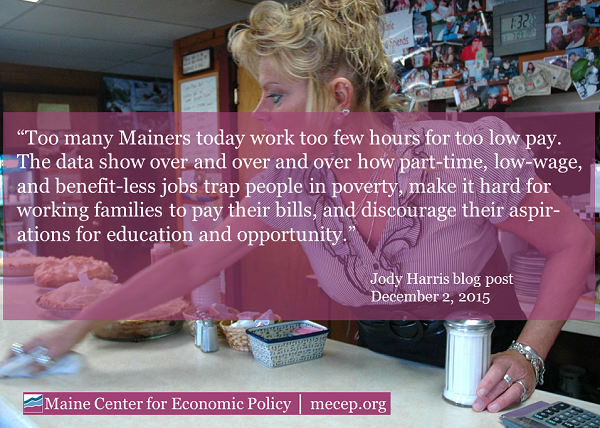Too many Mainers today work too few hours for too low pay. The data show over and over and over how part-time, low-wage, and benefit-less jobs trap people in poverty, make it hard for working families to pay their bills, and discourage their aspirations for education and opportunity.
In addition to low wages, retail and other service-sector workers struggle with precarious work schedules.
According to one study, 17% of the workforce lives with constantly-changing schedules. As The Atlantic reports:
Employees can wind up spending time, and money, commuting to their job, only to be told to leave early, or that they’re not needed at all that day. A sudden call to work can mean scrambling for child care, or turning down much-needed hours. And a constantly shifting schedule can lead to uneven earnings, with income spiking in some months and plummeting in others, making it incredibly difficult to budget. For students using part-time jobs to make ends meet, schedule changes can mean making a choice between attending class and earning enough money to pay tuition. For workers with kids, it can mean a constant struggle to find and afford child care. The problem is bigger than mere inconvenience.
Many service sector workers report that their hours can vary by as much as 10 hours from week to week, learning about schedule changes a week or less in advance, or even suffering retaliation when they are unable to adapt to a schedule change on short notice or request preferred shifts.[i]
Maine legislators have examined this issue, but they did not get very far. A bill last session to require advance notice for work schedules for hourly workers did not even make it out of committee.
Abusive work scheduling is not only bad for workers; it is also bad for the economy. For businesses, it can negatively affect a customer’s experience and cost the company profit. It also leaves a large segment of our economy―the part comprised of retail workforce―weak and stagnant, putting a drag on the whole economy.
Now, as Congress and states consider legislation to change labor regulations, big businesses are slowly responding, modifying some of the most egregious practices. Clearly, public pressure and media coverage have ignited this issue.
So as you are shopping this holiday season, consider the workers behind the counter and their families back at home. Think about how difficult it will be for them to enjoy the holidays while also earning a stable and predictable income. Make a New Year’s resolution to check up on the worker scheduling practices at the big, retail chains and shop where you can make a difference.
[i] Panelist remarks. Webinar. “Shop ‘til Who Drops? Exploring Retail Jobs this Holiday Season.” The Aspen Institute: Washington DC, December 1, 2015.




